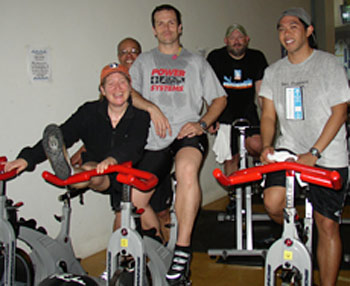UC Berkeley Web Feature
Bears on bikes
Cal
AIDS LifeCyclists get in gear for an arduous (and
memorable) ride
BERKELEY – This Sunday, June 3, a group of bicyclists proudly wearing the Cal script across their jerseys will leave San Francisco's Cow Palace, headed for Los Angeles. For seven days, they will ride as part of AIDS LifeCycle 6, a community of cyclists (and support crew) expected to number close to 3,000 and to hail from all over the world. The cyclists have each raised a minimum of $2,500 and trained for months to ride their bikes 545 miles. They've done it to raise funds for AIDS services and to remind us that HIV and AIDS still need our attention.
 Five members of the AIDS LifeCycle 6 Cal Team take a "spin" as part of their conditioning for the upcoming San Francisco-to-Los Angeles ride. (Sandra Clement photo) |
I am the very proud co-captain for the AIDS LifeCycle 6 (ALC) Cal Team. We expect to have 17 cyclists on the road for the week. This wonderful group is made up of graduate students, undergrads, alumni, faculty, staff, and "friends" (a word that does not adequately define their attachment to the campus but will have to do). I am in awe of the work they've put into training and fundraising for ALC while doing the other extraordinary things they do as part of the Cal community.
You will have the chance to hear from Cal cyclists this week — as they make their way south toward L.A. — thanks to wonderful web teams at both Cal and ALC. Members of the Cal Team will describe, in their own words, what brings them to this event, what they learned in preparing for it, and how it's going for them.
As for me, the first person I knew who died of AIDS was a UC Berkeley PhD candidate in political science who was a student in the research unit I worked in. He died in 1993. There are very important people in my life living with HIV, some of whom have benefited directly from the services offered by the San Francisco AIDS Foundation (SFAF). I participate for them and for those who don't have good health insurance to assure their care or don't have family or community to support them. SFAF also does public-policy advocacy that has made a difference nationally and internationally.
This will be my seventh year on the road with this event and my ninth year of being involved. I rode in 2001 — pedaled every mile between S.F. and L.A. (Before 2002, this fundraiser was called the California AIDS Ride and was produced by an event-management company for the beneficiaries, the San Francisco AIDS Foundation and the LA Gay and Lesbian Center. In 2002 the beneficiaries began to produce the event themselves and the name changed to AIDS LifeCycle.) Cal has not had a team for any of the ALC rides; I'm happy to have helped put one together this year.
AIDS LifeCycle route Day 1 (SUN. 6/3) Day 2 (MON. 6/4) Santa Cruz to King City Day 3 (TUES. 6/5) Day 4 (WED. 6/6) Day 5 (THURS. 6/7) Day 6 (FRI. 6/8) Lompoc to Ventura Day 7 (SAT. 6/9) Ventura to Los Angeles |
For the past six years, I have been a "roadie captain" in charge of bike parking. Roadies are the volunteers who go along for the week and make the event happen. They mark the route, lay out the tent grid (we camp each night in a temporary tent city), provide medical care, serve the food, load the bags, and pick up trash.
My team is responsible for the bicycle parking lot in camp. Each day, we set up bike racks made of 10-foot steel poles and aluminum A-frames. We welcome all the cyclists into camp at the end of the day (and record that they've made it) and then shoo them all out again the next morning. While they are riding, we break down, load our two trucks, drive to the next camp, and do it all again.
We are expecting 2,300 cyclists this year — and at 10 bikes parked per pole, my team of 20 will take down and put up at least 240 poles each day. I get to open the route each morning at 6:30 a.m.; my challenge is often making the early risers and eager beavers wait until I give the signal to go! The riders all have to be in camp by 7 p.m. It's a long day full of amazing people and excitement — and it never feels like work!
We are very proud to represent UC Berkeley and thank the Cal community for its support of our efforts. Anyone who would like to send our riders or entire team a message of support during the week can do that though the AIDS LifeCycle website.
We are also still happy to accept donations. Last year's event raised $8 million and we want to make that past total seem small. To donate to the Cal Team (and read earlier NewsCenter coverage on its fortunes), go to the Cal Team website.

